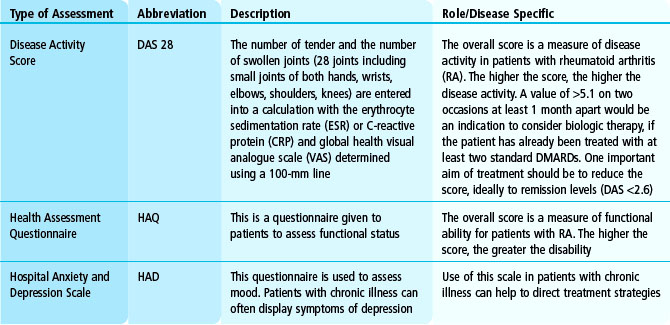7 Role of the allied health professional
Cases relevant to this chapter
3, 9–10, 14–17, 19–21, 31, 74–76, 79, 97
Essential facts
1. Patients can benefit from a multi-disciplinary approach where time can also be devoted to educating the patient about their condition.
2. Allied health professionals include Physiotherapists, Occupational Therapists, Nurse Specialists, Orthotists and Podiatrists who, in their extended role capacity, contribute to patient care.
3. Gait re-education is important after lower-limb joint replacement or trauma.
4. An orthosis may prevent unwanted motion, limit a normal range of motion, correct a mobile deformity, or accommodate fixed deformity.
Many musculoskeletal afflictions are longstanding and patients can benefit from a multi-disciplinary approach where time is devoted to education and clinics run by specialist allied health practitioners. This chapter will consider some of these roles.
Role of the nurse specialist
Nurse-led clinics
Verbal communication and patient education leaflets provide information for patients. Leaflets may provide information on disease-modifying anti-rheumatic drugs (DMARDs), non-steroidal anti-inflammatory drugs (NSAIDs) (see Chapter 5), coping with a flare or early morning stiffness, for example. Some leaflets may be developed in individual hospital departments or provided by Arthritis Research UK. Patients are given the opportunity to discuss any concerns and ask questions. The aim is to improve their understanding of their condition, awareness of drug therapy effects as well as their side-effects, and to promote self-help of their condition.
Nurses undertake a formal review of disease activity in patients with rheumatoid arthritis (RA), including assessment for tender and swollen joints. The nurse examines the upper limb joints and knees, and records the patient’s erythrocyte sedimentation rate (ESR) and C-reactive protein (CRP) level, and a global health visual analogue score. The Disease Activity Score (DAS 28), based on an assessment of 28 joints, is in widespread use (Table 7.1) and is a reliable, valid and practical assessment tool. Locally agreed protocols based on the severity of the patient’s DAS 28 score are used to determine changes in treatment; the higher the score, the more likely the need to increase or change treatment.
Assessment of functional status in RA may be undertaken using a standardized, structured, self-completed questionnaire, such as the Health Assessment Questionnaire (HAQ; see Table 7.1), to assess physical activity. It may also be helpful to assess a patient’s mood using the Hospital Anxiety and Depression Scale (HAD; see Table 7.1). If direct interview or the use of these questionnaires reveals significant reduction in physical functioning, changes in medication, further advice and information, and referral to physiotherapy and occupational therapy may be necessary. Patients with decreased mood may benefit from psychological support provided by nurse/therapy specialists and sometimes also require antidepressants.
Role of the physiotherapist
< div class='tao-gold-member'>
Stay updated, free articles. Join our Telegram channel

Full access? Get Clinical Tree









